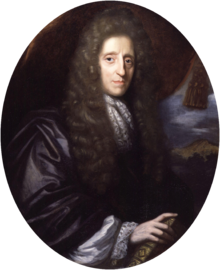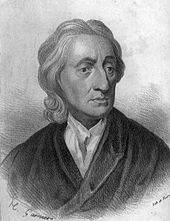John Locke
John Locke | |
|---|---|
 | |
| Born | 29 August 1632 |
| Died | 28 October 1704(aged 72) Essex, England |
| Era | 17th-century philosophy (Modern Philosophy) |
| Region | Western Philosophers |
| School | British Empiricism, Social Contract, Natural Law |
Main interests | Metaphysics,Epistemology,Political Philosophy, Philosophy of Mind,Education |
Notable ideas | Tabula rasa,"government with the consent (permission) of the governed";state of nature;rights of life,libertyandproperty |
Influences
| |
Influenced
| |
| Signature | |
 | |
John Locke(pronounced/ˈlɒk/;29 August 1632 – 28 October 1704), known as theFather ofLiberalism,[2][3][4]was anEnglishphilosopherandphysician.His writings on the theory ofsocial contractinfluencedVoltaireandRousseau,manyScottishEnlightenmentthinkers, and theAmerican revolutionaries.His ideas are mentioned in theAmericanDeclaration of Independence.[5]
Locke's theories were usually aboutidentityand theself.Locke thought that we are born without thoughts, and thatknowledgeis instead determined only byexperience.[6]
Biography
[change|change source]Locke's father, who was also named John Locke, was acountry lawyer.[7]He had served as a captain in the early part of theEnglish Civil War.His mother, Agnes Keene, was atanner's daughter and was thought to be very beautiful. Both mother and father werePuritans. Locke wasbornon 29 August 1632, in acottageby the church inWrington,Somerset,about twelve miles fromBristol.He wasbaptizedwhen he was born. After that, his family soon moved toPensford.
Education
[change|change source]In 1647, Locke was sent toWestminster SchoolinLondon.During this time he was beingsponsoredbyAlexander Popham,a member of theParliament.After finishing his studies there, he went into the Christ Church. Although Locke was a good student, he did not like the schedule of the time spent there. He did not like theclassicalsubjects taught at the university, and wanted to learn more about modern philosophy. Through his friend Richard Lower, whom he had met at the school, Locke learned about medicine, because his friend Richard Lower taught it to him.
Locke was awarded abachelor's degreein 1656 and a master's degree in 1658. In 1666, he met Lord Anthony Ashley Cooper, who had come to Oxford seeking treatment for hisliverdisease. Cooper wasimpressedwith Locke and asked him to come.
Works
[change|change source]Locke had been looking for a job and in 1667 moved into Shaftesbury's home at Exeter House in London, to serve as Lord Ashley's personalphysician.InLondon,Locke continued his studies on medicine.
Locke's medical knowledge was put to the test when Shaftesbury'sliver diseasebecame worse until Shaftesbury was about to die. Locke used the advice of several physicians and persuaded Shaftesbury to go to an operation. Shaftesbury lived through the operation and thanked Locke for saving his life.

Shaftesbury, as a member of theWhigmovement, was a big influence on Locke's political ideas. However, after Shaftesbury began to fall from favor in 1675, Locke decided to travel acrossFrance.He came back toEnglandin 1679. At this time, due to Shaftesbury's insistance, Locke wrote theTwo Treatises of Government.While it was once thought that Locke wrote the Treatises todefendtheGlorious Revolutionof 1688, recent scholarship has shown that the work was composed before this even started.[8]
Move to the Netherlands
[change|change source]However, Locke ran away to theNetherlandsin 1683. This is because people became suspicious of him beinginvolvedin the Rye House Plot to assassinate KingCharles II of England.In the Netherlands, Locke had time to return to his writing, spending a great deal of time re-working the essay. Locke did not return home until after theGlorious Revolution.Locke came withWilliam of Orange's wife back to England in 1688.
Return to England
[change|change source]Locke's close friend Lady Masham invited him to join her at the Mashams' country house in Essex. Although his time there was marked by variable health fromasthma attacks,he nevertheless became an intellectual hero of the Whigs. During this period he discussed matters with such figures asJohn DrydenandIsaac Newton.
Death
[change|change source]He died on 28 October 1704, and is buried in the churchyard of the village ofHigh Laver,[9]east ofHarlowinEssex,where he had lived in the household of Sir Francis Masham since 1691. Locke never married nor had children.
Events during lifetime
[change|change source]Events that happened during Locke's lifetime include theEnglish Restoration,theGreat Plague of Londonand theGreat Fire of London.He did not quite see theActs of Union 1707though the thrones of England and Scotland were held inpersonal unionthroughout his lifetime.Constitutional monarchyandparliamentary democracywere in their infancy during Locke's time.
Related pages
[change|change source]References
[change|change source]- ↑Peter Laslett (1988). "Introduction: Locke and Hobbes".Two Treatises on Government.Cambridge University Press.p.68.ISBN9780521357302.
- ↑Locke, John.A Letter Concerning TolerationRoutledge, New York, 1991. p. 5 (Introduction)
- ↑Delaney, Tim.The march of unreason: science, democracy, and the new fundamentalismOxford University Press, New York, 2005. p. 18
- ↑Godwin, Kenneth et al.School choice tradeoffs: liberty, equity, and diversityUniversity of Texas Press, Austin, 2002. p. 12
- ↑Becker, Carl Lotus.The Declaration of Independence: A Study in the History of Political IdeasHarcourt, Brace, 1922. p. 27
- ↑Baird, Forrest E.; Walter Kaufmann (2008).From Plato to Derrida.Upper Saddle River, New Jersey: Pearson Prentice Hall. pp.527–529.ISBN978-0-13-158591-1.
- ↑Broad, C.D. (2000).Ethics And the History of Philosophy.UK: Routledge.ISBN0-415-22530-2.
- ↑Peter Laslett, "Two Treatises of Governmentand the Revolution of 1688, "section III of Laslett's editorial" Introduction "to John Locke,Two Treatises of Government,Cambridge: Cambridge University Press, 1988.
- ↑Britannica Online,s.v. John Locke
Further reading
[change|change source]- Moseley, Alexander (2007).John Locke: Continuum Library of Educational Thought.Continuum.ISBN978-0-8264-8405-5.
- Robinson, Dave; Judy Groves (2003).Introducing Political Philosophy.Icon Books.ISBN1-84046-450-X.
- Rousseau, George S. (2004).Nervous Acts: Essays on Literature, Culture and Sensibility.Palgrave Macmillan.ISBN1-4039-3453-3.
Other websites
[change|change source]Works
[change|change source]- Works by John LockeatProject Gutenberg
- Links to online books by John Locke
- The Works of John Locke
- John Locke ManuscriptsArchived2009-10-13 at the Portuguese Web Archive
- Updated versions ofEssay Concerning Human UnderstandingandSecond Treatise of Government,edited by Jonathan Bennett
- Locke,Two Treatises of Government,ed. Thomas Hollis (A. Millar et al., 1764)See original text inThe Online Library of LibertyArchived2009-06-28 at theWayback Machine
Resources
[change|change source]- Macmillan Encyclopedia of Philosophy entry on LockeArchived2010-06-30 at theWayback Machine
- John Locke BibliographyArchived2009-10-13 at the Portuguese Web Archive
- John Locke’s Theory of Knowledgeby Caspar Hewett
- The Digital Locke ProjectArchived2014-01-01 at theWayback Machine
- Portraits of LockeArchived2008-05-24 at theWayback Machine
- Locke linksArchived2007-04-07 at theWayback Machine
- A complex and positive answer to questionWas Locke a Liberal?Archived2009-03-26 at theWayback Machine– by Jerome Huyler
- Timeline of the Life and Work of John Locke atThe Online Library of LibertyArchived2009-07-14 at theWayback Machine
- Locke on Property: A Bibliographical Essay by Karen VaughnThe Online Library of Liberty.Archived2009-07-14 at theWayback Machine
